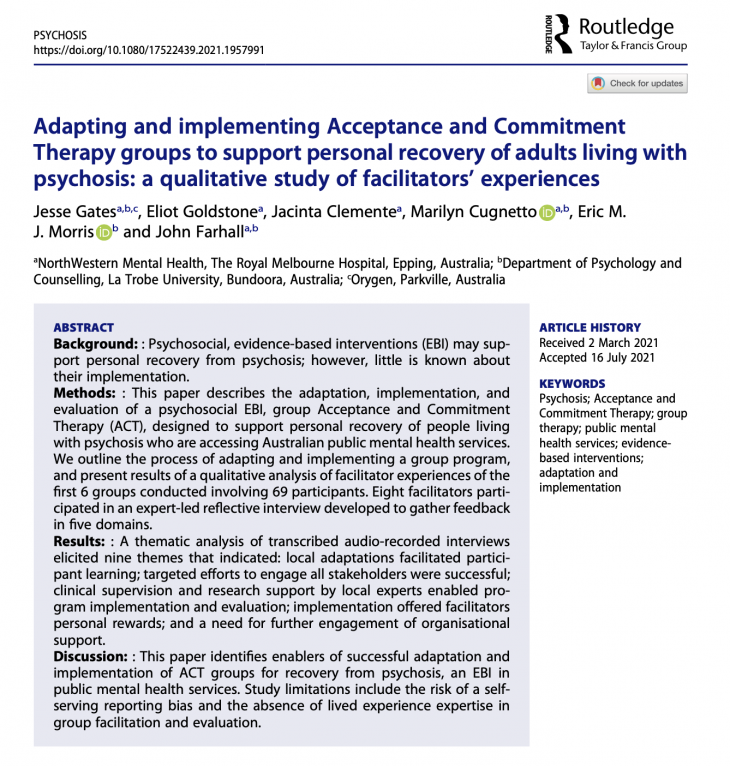
It is excellent to share our latest paper on ACT for psychosis groups, published online in the journal Psychosis.
This paper shares what it is like to set up a group program that offers Acceptance and Commitment Therapy for psychosis in public mental health settings.
We report on the experiences of facilitators who adapted the ACT for Recovery group protocol to local needs in north-west Melbourne, Australia (called “Recovery ACT”) and what they discovered in running groups for people recovering from psychosis. We used a thematic analysis to identify important themes about adaptation and implementation of groups in community mental health teams.
The paper summarises the themes emerging from facilitators’ experiences, such as the value of supervision, learning the group protocol, organisational support, and the rewarding personal experiences of running the groups.
We hope this paper will be useful for people running these groups in their own settings. The paper outlines the steps we took, and how helpful it was to have the support of service management and clinician enthusiasm to do this. Facilitators also describe advantages in having input from clinical academics to enable a successful evaluation of this service development.
Facilitators also share what it is like to learn to do ACT groups, including how running these sessions may differ from other groups, particularly with the pacing, use of repetition and metaphors.
This study was a collaboration between clinicians working at NorthWestern Mental Health and researchers at La Trobe University in Melbourne, Australia. We are grateful to the mental health consumers who participated in the groups and the associated research studies. The Recovery ACT program is currently being evaluated across four health services in Melbourne (NorthWestern Mental Health; Alfred Health; St Vincent’s Mental Health; Peninsula Health) .
The pre-print of the paper is freely available here.
I think of this paper as a companion piece to the study we published earlier this year of group participant experiences, also in the Psychosis journal.
There is also a published treatment manual describing ACT for Psychosis Recovery and various ways to train and support group facilitators (published by New Harbinger).
If you are interested in the background of this ACT for psychosis group program and evaluations, you can check out a recorded presentation.
Adapting and implementing Acceptance and Commitment Therapy groups to support personal recovery of adults living with psychosis: A qualitative study of facilitators’ experiences
Authors: Jesse Gates, Eliot Goldstone, Jacinta Clemente, Marilyn Cugnetto, Eric Morris & John Farhall
Background: Psychosocial, evidence-based interventions (EBI) may support personal recovery from psychosis; however, little is known about their implementation.
Methods: This paper describes the adaptation, implementation, and evaluation of a psycho-social EBI, group Acceptance and Commitment Therapy (ACT), designed to support personal recovery of people living with psychosis who are accessing Australian public mental health services. We outline the process of adapting and implementing a group program, and present results of a qualitative analysis of facilitator experiences of the first 6 groups conducted involving 69 participants. Eight facilitators participated in an expert-led reflective interview developed to gather feedback in five domains.
Results: A thematic analysis of transcribed audio-recorded interviews elicited nine themes that indicated: local adaptations facilitated participant learning; targeted efforts to engage all stakeholders were successful; clinical supervision and research support by local experts enabled program implementation and evaluation; implementation offered facilitators personal rewards; and a need for further engagement of organisational support.
Discussion: This paper identifies enablers of successful adaptation and implementation of ACT groups for recovery from psychosis, an EBI in public mental health services. Study limitations include the risk of a self-serving reporting bias and the absence of lived experience expertise in group facilitation and evaluation.
Keywords: psychosis; Acceptance and Commitment Therapy; group therapy; public mental health services; evidence-based interventions; adaptation and implementation
